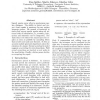107
click to vote
COLING
2010
14 years 9 months ago
2010
Unrehearsed spoken language often contains disfluencies. In order to correctly interpret a spoken utterance, any such disfluencies must be identified and removed or otherwise deal...
107
click to vote
ACL
2009
14 years 12 months ago
2009
This paper describes a parsing model for speech with repairs that makes a clear separation between linguistically meaningful symbols in the grammar and operations specific to spee...
132
click to vote
COLING
2000
15 years 1 months ago
2000
Speech repairs occur often in spontaneous spoken dialogues. The ability to detect and correct those repairs is necessary for any spoken language system. We present a framework to ...
100
click to vote
COLING
2000
15 years 3 months ago
2000
Results presented in this paper strongly support the notion that similarities as well as differences in language systems can be empirically investigated by looking into the lingui...
103
click to vote
ACL
2004
15 years 3 months ago
2004
This paper describes a noisy channel model of speech repairs, which can identify and correct repairs in speech transcripts. A syntactic parser is used as the source model, and a n...
111
click to vote
ACL
2008
15 years 3 months ago
2008
This paper describes a syntactic representation for modeling speech repairs. This representation makes use of a right corner transform of syntax trees to produce a tree representa...
129
click to vote
KONVENS
2000
15 years 5 months ago
2000
Speech repairs occur often in spontaneous spoken dialogues. The ability to detect and correct those repairs is necessary for any spoken language system. We present a framework to ...

